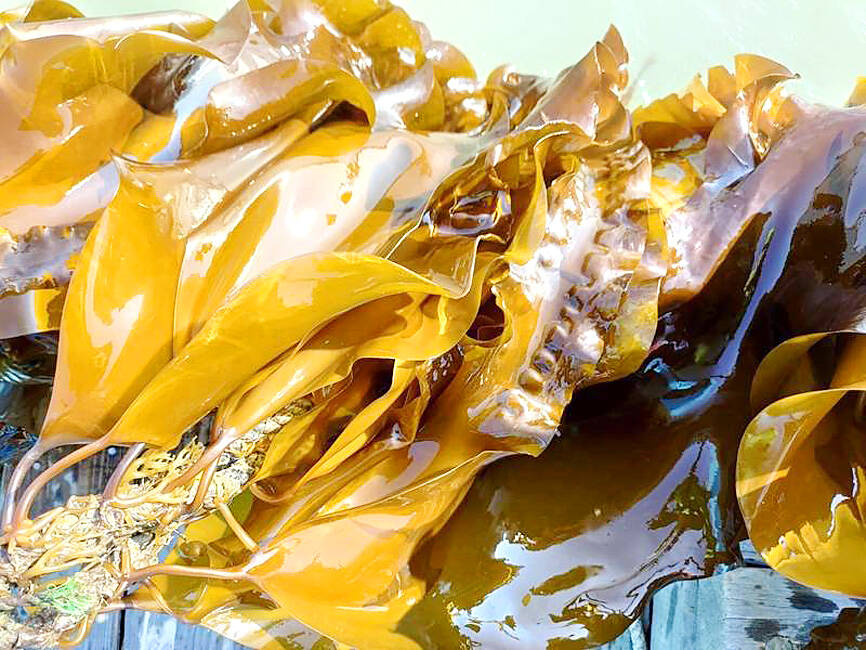Encouraging growth of Bacteroides plebeius can potentially suppress colitis-associated colon cancer development, Academia Sinica researchers said.
Institute of Biological Chemistry, Academia Sinica researcher Meng Tzu-ching (孟子青) said that he and his team conducted the research due to the prevalence of colorectal cancer in Taiwan, which can be caused by multiple factors, including chronic inflammation, genetic disposition, gut dysbiosis and genetics.
Dietary habits and predilection for exercise are other possible causes, Meng said.

Photo courtesy of the Fisheries Research Institute
This bacteria, which are also known as Phocaeicola plebeius, are commonly found in Japanese people, who have a reputation for longevity and healthy digestion, as well as eating seaweed and kelp at least two or three times per week, the researchers said.
The team undertook the project to attempt to show a causal relationship between B plebeius and Japanese gut health, with colonization of the bacteria in mice guts facilitating an evaluation of the long-term effects on colon cancer development, they said in a paper, “Gut colonization of Bacteroides plebeius suppresses colitis-associated colon cancer development,” which was published in the journal Microbiology Spectrum on Jan. 13.
Mice that were given seaweed and kelp showed a greater tendency of high rates of B plebeius growth, the paper said.
Colonies were studied from gnotobiotic and specific-pathogen-free mice that had been given azoxymethane and dextran sulfate sodium (AOM/DSS) — tumor promoting substances, Meng said.
Tissue samples collected after 90 days of AOM/DSS administration showed that tumor number, burden and size in the population of mice fed a seaweed diet and B plebeius were significantly reduced compared with mice fed the seaweed diet alone, the report said.
B plebeius can effectively restructure the gut microbial community and produce beneficial metabolites to inhibit colon cancer development, it said.
The bacteria have potential as a therapeutic agent in cancer prevention, it added.
Preliminary investigations show that more than half of Taiwanese have B plebeius in their guts and that further research would look into how the bacterium inhibit colon cancer.

Taiwan is stepping up plans to create self-sufficient supply chains for combat drones and increase foreign orders from the US to counter China’s numerical superiority, a defense official said on Saturday. Commenting on condition of anonymity, the official said the nation’s armed forces are in agreement with US Admiral Samuel Paparo’s assessment that Taiwan’s military must be prepared to turn the nation’s waters into a “hellscape” for the Chinese People’s Liberation Army (PLA). Paparo, the commander of the US Indo-Pacific Command, reiterated the concept during a Congressional hearing in Washington on Wednesday. He first coined the term in a security conference last

A magnitude 4.3 earthquake struck eastern Taiwan's Hualien County at 8:31am today, according to the Central Weather Administration (CWA). The epicenter of the temblor was located in Hualien County, about 70.3 kilometers south southwest of Hualien County Hall, at a depth of 23.2km, according to the administration. There were no immediate reports of damage resulting from the quake. The earthquake's intensity, which gauges the actual effect of a temblor, was highest in Taitung County, where it measured 3 on Taiwan's 7-tier intensity scale. The quake also measured an intensity of 2 in Hualien and Nantou counties, the CWA said.

The Overseas Community Affairs Council (OCAC) yesterday announced a fundraising campaign to support survivors of the magnitude 7.7 earthquake that struck Myanmar on March 28, with two prayer events scheduled in Taipei and Taichung later this week. “While initial rescue operations have concluded [in Myanmar], many survivors are now facing increasingly difficult living conditions,” OCAC Minister Hsu Chia-ching (徐佳青) told a news conference in Taipei. The fundraising campaign, which runs through May 31, is focused on supporting the reconstruction of damaged overseas compatriot schools, assisting students from Myanmar in Taiwan, and providing essential items, such as drinking water, food and medical supplies,

Prosecutors today declined to say who was questioned regarding alleged forgery on petitions to recall Democratic Progressive Party (DPP) legislators, after Chinese-language media earlier reported that members of the Chinese Nationalist Party (KMT) Youth League were brought in for questioning. The Ministry of Justice Investigation Bureau confirmed that two people had been questioned, but did not disclose any further information about the ongoing investigation. KMT Youth League members Lee Hsiao-liang (李孝亮) and Liu Szu-yin (劉思吟) — who are leading the effort to recall DPP caucus chief executive Rosalia Wu (吳思瑤) and Legislator Wu Pei-yi (吳沛憶) — both posted on Facebook saying: “I